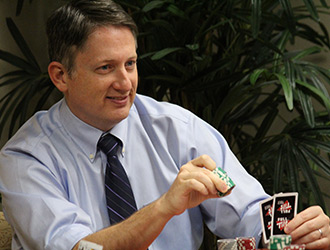 Dan Ravicher is a cutthroat on the poker tables. The 40-year-old seems like a pleasant enough fellow but gives no quarter when playing, even with one whose previous card playing experience is confined to playing Go Fish with preschoolers, and losing. He “stacks” me, taking all my chips.
Dan Ravicher is a cutthroat on the poker tables. The 40-year-old seems like a pleasant enough fellow but gives no quarter when playing, even with one whose previous card playing experience is confined to playing Go Fish with preschoolers, and losing. He “stacks” me, taking all my chips.
Ravicher, the inaugural director of the Larry Hoffman|Greenberg Traurig Startup Law Practicum, is used to taking all the chips, figuratively. He successfully took on Big Pharma more than once.
In 2003, after three years at the New York office of a highly successful Silicon Valley firm that specialized in startups and IPOs, he started his own non-profit, the Public Patent Foundation. He did it with backing from Echoing Green, the global social entrepreneurship investment firm that uses venture capital principles to increase social impact; the Open Society Foundation, the international grant-making network that supports advancing justice, education, public health, and independent media; and the Rockefeller Foundation.
“PUBPAT was the merging of my two major interests in law school: social justice/human rights and technology,” Ravicher says. “There is a real problem in the way that we regulate access to technology in this country that denies fair access to the poor and underprivileged. Because no one else was tackling it head on, I had to form my own organization to bring cases on behalf of the public interest or specific individuals who were being wrongly denied access to technology that they needed.”
One particular area of imbalance has been the patent holders of genes. “None of those patents should have ever been granted,” he says. “We filed a lawsuit against the Patent Office and the patent holder on behalf of patients related to the genes inside our body that correlate to increased breast and ovarian cancer risk. For no reason other than the existence of patents on the genes, the cost of testing their doctors told them they needed to get was out of reach for our clients. The patent office had adopted improper, and illegal, policy in granting patents on human genes. The Patent Office is only allowed to patent inventions, not nature, and a gene inside our body is nature.
“The case went to the Supreme Court,” he says, “and they ruled nine to zero for us that it is indeed not legal for the government to grant patents on human genes, which in essence gives complete control over parts of our bodies to profit-seeking corporations.”
Ravicher, who was born in Colorado but lived in Japan and Europe as a military kid, always leaned a bit techie though he was, and is, a bit of a jock, too. Growing up he loved playing football, basketball, and golf but also was the kid who was taking apart radios and started writing his own software – on Commodore 64 computers in electronics stores – in third grade. He also rocked – no judgment here – an awesome handmade Darth Vader costume when he was seven years old. “It was absolutely amazing,” he says.
Ravicher was also in a hip-hop group. “We made up our own little songs and danced,” he says. “We called ourselves Two-Thirds Black because we were all into math – a math nerd hip-hop group.” Sadly, he recalls, they didn’t become international sensations because, he is sure, YouTube had yet to launch.
His dad was an engineer, so he was an engineer, studying at the University of South Florida with a minor in political science. He focused on material science – a blend of civil and chemical engineering. He took the LSAT after he noticed a posting for a free prep class and was told by the sales rep he didn’t need it.
At the University of Virginia School of Law, he studied to be a patent and technology lawyer but dabbled in voting rights, environmental law, human rights, and social issues. By his 2L year, he helped create a patent and licensing clinic between the law school and UVA’s tech transfer office and in his third year helped launch a Charlottesville-based tech incubator. He laughs about those days during the dotcom boom when he passed up a Federal Court of Appeals clerkship in order to work for startups.
After 11 years in New York, Ravicher, his wife, Maciel, and six-month-old son, Max, now live in Coral Gables. Ravicher, twice named one of the “50 Most Influential People in IP” by Managing Intellectual Property magazine, will have the practicum in full swing in January 2016, his students assisting clients with the host of issues that confront budding entrepreneurs, including: selecting and forming a business entity, such as LLC or C-corp; evaluating, negotiating and documenting financing transactions (equity and debt); drafting independent contractor, employee, joint venture and other agreements; protecting intellectual property, including applying for patents and trademark; and drafting Terms of Service and Privacy Policies for websites and apps.
But for now, he is holding the nuts and I have lost all my chips. Two words appear in my head: Card Shark.
Read Press Release About this New Program

